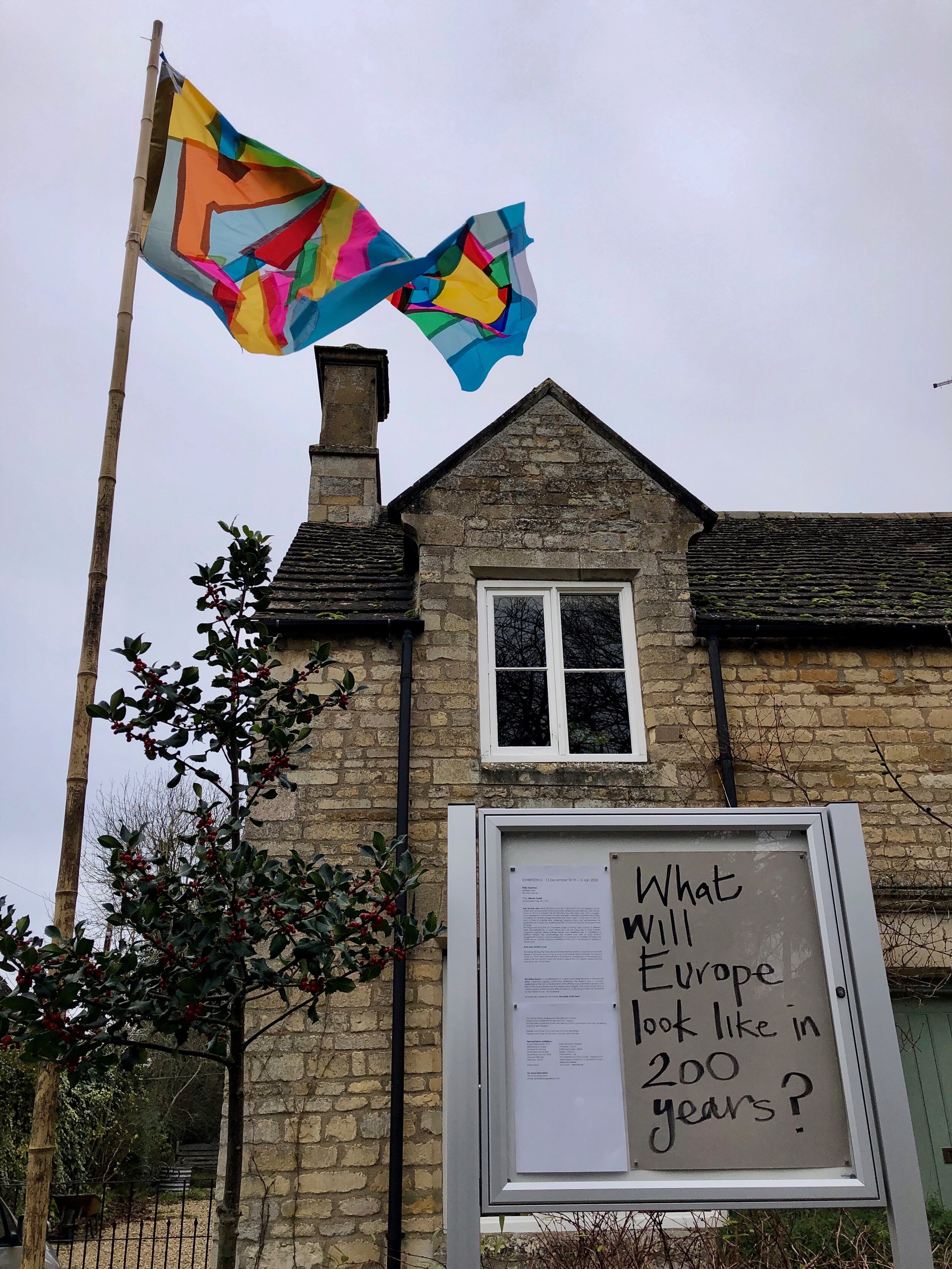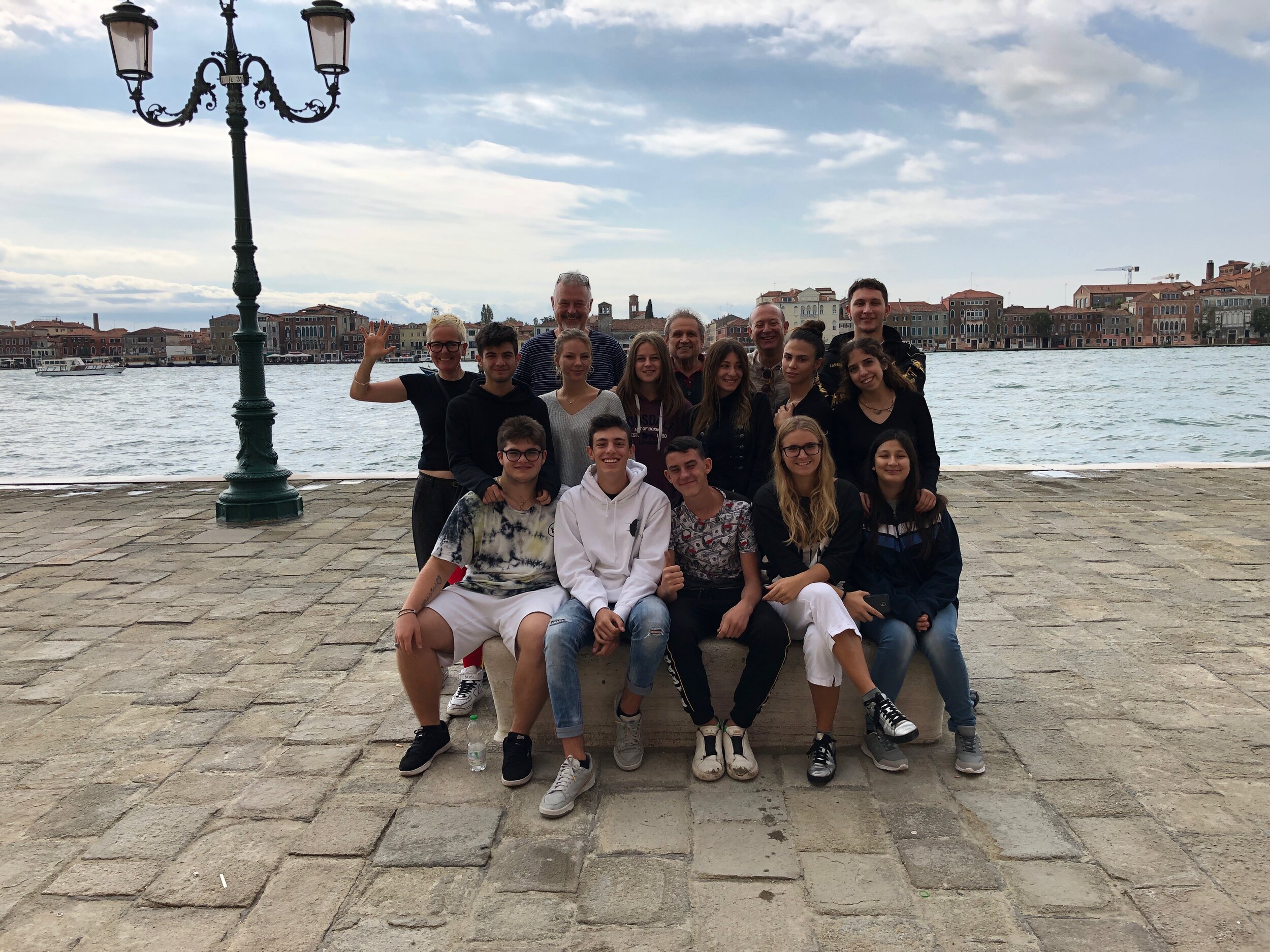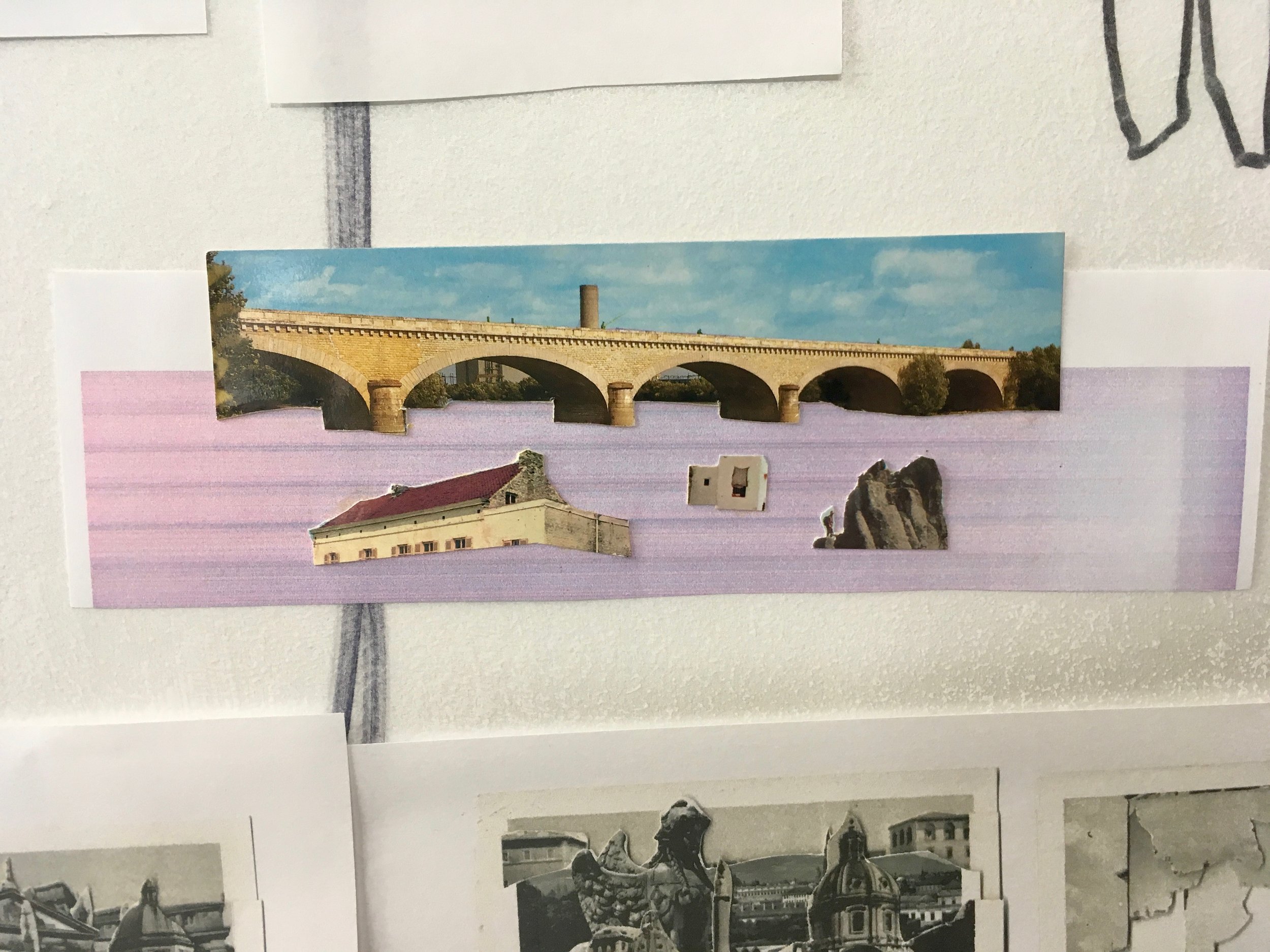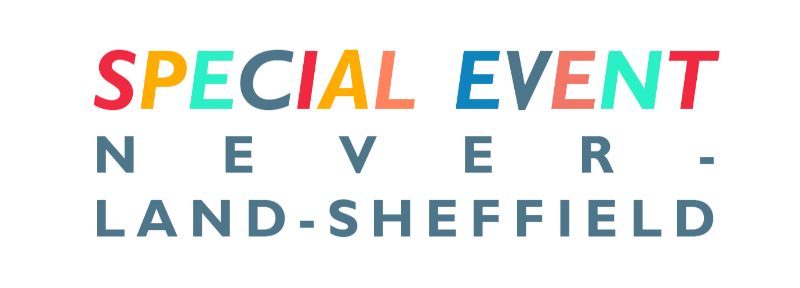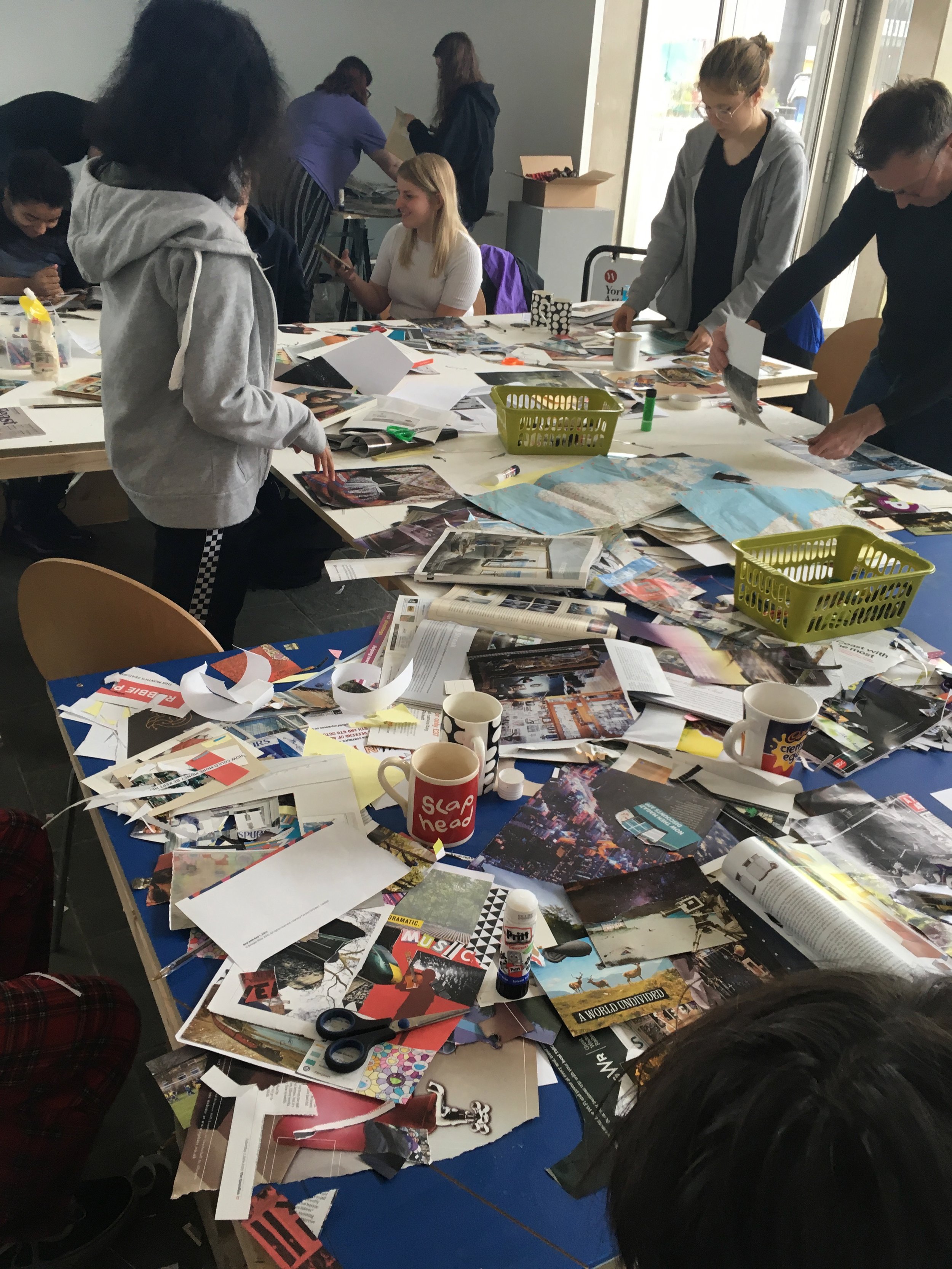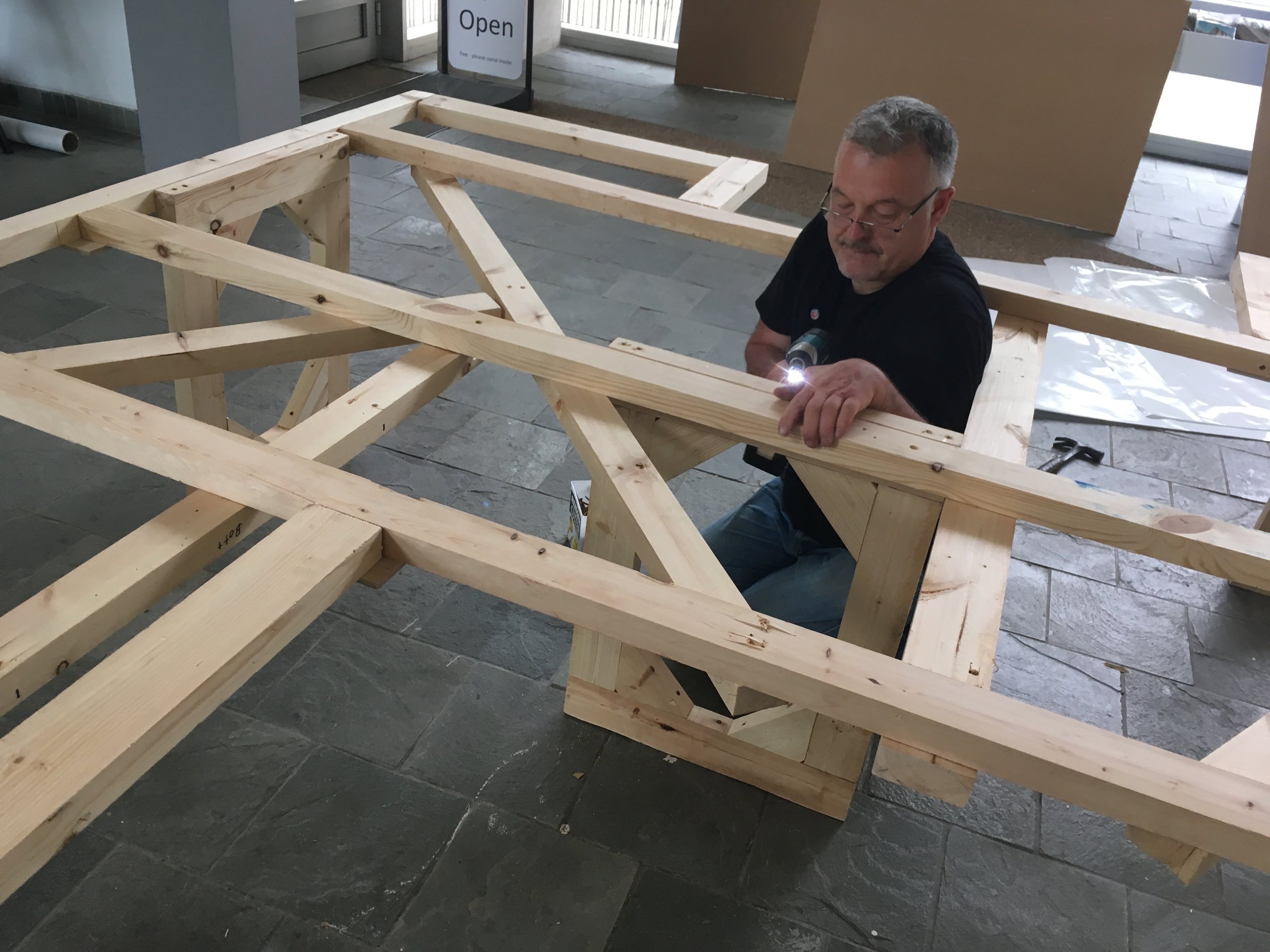We were really pleased to get the final films from the students at Liceo Michealangelo Guggenhiem yesterday, relating to our work with them. What a great connection we have there and feel really happy to be able to support their generosity in return
The lands of the free? Never-Land Uffington
We are really pleased to be able to extend the Never Land project to rural Lincolnshire and The Notice Board project. Below is the text that accompanies our poster and flag:
EXHIBITION 5 15 December 2019 – 15 Jan 2020
Poly-Technic
Initiated 2006.
No fixed abode.
Title: Never-Land
Handmade Flag . 2m x 3m
Poly-Technic asks: What will Europe look like in 200 years? Can we imagine a place where national boundaries have evaporated, where everyone belongs, and nobody stands on the in or outside? The last 200 years has seen many wars, many struggles, many generations. Communism has risen and fallen; capitalism reaches its end stage; the impact of climate change becomes ever more urgent. At this point in time we want to think to a better time, challenge negative scripts and acknowledge the possibilities for a future that understands itself. A future not tied into the present state of things.
The flag is one outcome of a European project involving many authors of different ages and experiences. In each Never-Land site we have tried to think forward, imagining together taking collage literally and metaphorically in considering a different Europe. We acknowledge the students and staff of Liceo Artistico Guggenheim School in Venice, participants of a workshop at Leicester Printworks and audiences at Yorkshire Artspace, Sheffield for their part in the process of creating a Never-Land
www.poly-technic.co.uk
By hosting this flag The Notice Board enables the Poly-Technic to continue its work with people in places by doing things and become another Never-Land site. This allows us to ask you: What will Europe look like in 200 years? In consideration of this question you extend the Poly-Technics work and have an opportunity to imagine a place that may truly be a Land of the Free?
The Notice Board is a contemporary art project showcasing the work of international artists. Featuring ongoing month-long exhibitions, the project aims to connect audiences to the work of diverse artists whilst offering unusual exhibition spaces in the form of this Notice Board and the neighbouring Flagpole. The Notice Board aims to create a place where beautiful, difficult, political, challenging artworks can be shared for the interest of you - the audience.
All works are curated on the theme: The Lands of the Free?
The Notice Board understands International to mean:
People born outside the UK and who live overseas.
People born outside the UK who live here as citizens, have leave to remain, be seeking asylum or are refugees.
People born in the UK but who live and work elsewhere.
People born in the UK who show artwork internationally.
Past and future exhibitions:
August/September 2019: Kate Genever - England
September/October Ai Weiwei - China
October/November Katie Numi-Usher - Belize
November/December Pespe – Poland
December/January 2020 Poly-Technic – UK
January/February Katy Hawkins and Nicki Dwyer – England/USA
February/ March Geoff Diego-Litherland & Angharad McLaren -
Mexico/Scotland
March/April Tom Lowe – Netherlands
For more information:
#noticeboardunited
Email: kate@kategenever.com
Neverland Rivers - Collage
Finally finished the collages started in Venice using found postcards. Having access to so many postcards makes you realise the internationally common card themes - rivers/canals, coastlines, mountains, sea, boats, bridges, cathedrals, large houses, religous imagery and amazingly beds? Using multiple cards and different layouts the works offer reflection on the project theme - Never-land and i hope say more about our commonalities rather than our differences as we think about what Europe will look like in 200 years
Only in Venice
Steve and I present a paper as part of The Great Community - Ruskin in Europe in Ca’Foscari as part of our Never-Land project. This is the room we spoke in - a Never land indeed? Part of our paper is below, but in summary we spoke of Collage and Europe and 200 years from now. We hoped to offer our view in response to the Utopian strand of the conference:
…………Never-Land is our fictional nowhere. Its ambition is to imagine what Europe will look like in 200 years. John Ruskin was born only 4 years after the battle of Waterloo, he took his first trip to Europe in 1833, the year the British abolished slavery. When the young Ruskin stepped onto land in Calais, the horse and the hand were still the driving force behind human industry. In looking backwards 200 years, we wondered what it could have been possible to predict of today. In looking forward - we ask - Will it be a place that acknowledges John Ruskin’s love of beauty and nature? Will it value the hand and personal creativity and the importance of collective action?
Practically we have set up spaces where people can come together to share their visions through talking, debate, reflection and making. We have utilised 100s of found European postcards, inviting people to collage using magazines, imagery, words - to add their vision on top. The only rule was that the vision must be positive. We feel the project has supported people to address what is scary or what has potential, what is urgent, what is not. It has helped us to think about how we all often default to negativity, the importance of seeing and being seen. Neverland is a space of resistance in many ways.
Why 200 years? We felt 200 years put you far enough into the future so you weren’t tied to what was happening now. It also links to Ruskin and his birth. The changes of the last 200 years would suggest you can’t predict a reality. We can only speculate.
Why Collage? Practically Collage allows you quickly to imagine things differently. Using found imagery lets you not be constrained by lack of ‘drawing’ skill. You can put images together quickly - like the rhinos in a city. Ideas are made fast.
Collage Emphasises concept and process over end product, collage brings the incongruous into meaningful congress with the ordinary
Collage also is important in a larger sense, it expands off a surface. We can imagine this conference and some of Ruskin’s works maybe doing this – the layering of ideas and placing things next to one another that aren’t obvious.
To make a collage you have to have imagery coming together, layering and merging – it warps reality in many ways. There is a push and pull. You can play with space, perspective, reality. fantasy. It is propositional. The perfect method to complement/extend the title or them…..
We came we saw we Never-Landed
We are really happy to have been so generously welcomed into Michealangelo Guggenhiem School to make and explore and think and exhbit work with their students. Our trip to Venice resulted in lots of new friendships and cemented partnerships between us , the Italian teachers and CaFoscari university. We feel proud to have been able to generate work that asks hard questions of audience and the organisations involved. Further photos of the the trip and work can be found in the NEVER-LAND section
Never-Land Venice. 2019
Never-Land makes its way to Venice in a couple of weeks.. It the next iteration of the project which at this significant point in history wants to think to a better time, challenge negative scripts and acknowledge the possibilities for a future that understands itself in ways that are not tied into the present state of things. Never-Land presented in Venice is the 2nd part of a European project involving many authors of different ages and abilities. The students of Liceo Artistico Guggenheim School, Venice with support of their staff are the 2nd cohort. Yorkshire Artspace Sheffield was the first and on our return we move to Leicester Printworks - we acknowledge these and their participants as part of the process of creating a Never-Land.
In each city we are trying to think forward, imagining together taking collage literally and metaphorically in considering a different Europe. We have generated new artworks that propose and provoke further questions. The outcomes on display in CFZ within Ca’Foscari University, are drawn from across the larger project and include digital prints created by Liceo Artistico Guggenheim students.
We are presenting the work made during our Venice stay along with work from Sheffield at both the international conference at CaFoscari University: John Ruskin’s Europe and in an exhibition at CFZ in Zattre for the month of October. We will also lead an open discussion and short presentation at the opening of the exhibition.
Poly Sculpure Training Day at Temple Newsam Halton School. Leeds
We were really happy to deliver a training day with the whole Staff at Temple Newsam Halton School in Leeds. We had much fun developing new work together, working in small teams and building large interventions in different classrooms - including large inflatables. How fantastic that a school wants children to develop more 3D work and we felt really happy knowing that they were going to start their own 4th plinth for pupils work to be imagined and made for. The day was arranged by Artforms Leeds and supported directly by the school.
Peterborough Pride Placards
Happy to support Pride efforts in Peterbrough and be part of such a great DIY ground up project
Never-Land Sheffield moves from Sheffield to Leicester Printworks
We are really happy with how the Yorkshire Artspace neverland incarnation ended. It moves on to Leicester Printworks on Sept 14th. Here’s a link for more info
Special Event - photos
We had a great evening at YA persistence works sharing the Never-Land work over a beer. One of the commissioned writers visited and people made some great new postcards. The space is still active until the 14th July and we hope more ideas get added before it all comes down and moves to Leicester and then Venice later in year.
Invite to join us....
An invitation to join us...
TOMORROW - Thursday 4th July, 5-8pm
Join us for this special event with Kate Genever and Steve Pool of Poly-Technic, the arts collaborative who devised Never-Land-Sheffield, a takeover of our Persistence Works Gallery by young people from across Sheffield. Come and hear from the artists about the inspiration behind the co-creation of this new collaborative artwork which explores what Europe might look like in 200 years.
On the night there is an open invitation to everyone attending to join the debate and add to this evolving work, the final iteration of which will go to an international conference Ruskin and Europe in Venice in the autumn.
The event is free to attend - just turn up - or let us know your coming by RSVP here.
The gallery is also open to the public every Friday 2-7pm and Saturday and Sunday 11am-4pm until 14th July.
Image credit: Poly-Technic, students from Longley Sixth-Form College
Peterborough Pride Placards - doing the business!!
Art is essential...
Rather brilliantly S.Carley the teacher who accompanied the King Edwards group to the Never-Land space at YA wrote this in response and sent it to his head teacher to argue again the role and importance of art and art experiences for students… makes for some good reading
Visual Analysis and Contextual Studies; John Ruskin: Art & Wonder. June 13th 2019.
Never-Land-Sheffield ‘take-over sessions’. June 14th 2019.
Here my idea is to declare that art is the only possibility for evolution, the only possibility to change the situation in the world. But then you have to enlarge the idea of art to include the whole creativity. And if you do that, it follows logically that every living being is an artist - an artist in the sense that he (or she) can develop their own capacity. And therefore it's necessary at first that society cares about the educational system, that equality of opportunity for self-realization is guaranteed. Joseph Beuys.
A small group of Y12 students were recently engaged in two days of challenging, exciting, creative work with external partners. Working with Helen Higgins and Francesca Herrick of the Courtauld Institute Outreach team, and Poly-technic (artists Kate Genever and Steve Pool), students investigated context, theory, history and society in the context of a Sheffield specific framework - Ruskin, The North, Europe / Brexit and the environment.
Approaches ranged from a very analytical research base investigating art and social history via curating and archiving, through to a more observational, experimental and collaborative process based approach using ‘collage’ (in its broadest sense).
Helen and Francesca from the Courtauld looked at visual analysis and contextual studies working with key images and texts linking to the Millennium Galleries exhibition; John Ruskin: Art & Wonder.
The students were challenged intellectually and creatively throughout the day working within undergraduate frameworks of teaching and learning. There was a distinct sense they had been stretched and challenged over the course of the day as we approached the final half hour! It was refreshing and rewarding to see our students engage with our visitors and the exhibition in such a mature and enthused fashion. Most crucially, they were able to make succinct connections to their own creative practise in school, thereby really investing in their Component One coursework for A level Fine Art and Photography. Critical thinking in a creative context is a key skill for students to acquire at A level and beyond.
The Never-Land-Sheffield session took place at Yorkshire Artspace, Persistence Works Gallery, the following day. It was billed as a “takeover session”. Students were encouraged to change the space through collage based process led by artists Steve Pool and Kate Genever.
The artists describe Never-Land-Sheffield as a fictional nowhere, imagined for this project. Its ambition is to ask young people what Europe will be like in 200 years. Steve and Kate from The Poly-Technic worked through discussion, collage and large-scale intervention to start a dynamic large-scale installation aiming to challenge negative scripts around Europe / Brexit. Our students set the project rolling with one of the first group interventions in the month long takeover. Their collage inputs, discussions and comments helped set the scene for other groups and individuals to work with and respond to.
Never-Land-Sheffield is the initial and catalysing part of a 3-stage project with multiple partners from the UK and Europe (including schools and colleges in Leicester and Venice).
One of our Y12 students also was the winner of a writing commission via ‘Making Ways’ Sheffield, to compose a response to Never-Land-Sheffield. Rhianna Lewis-Tottle wrote;
‘In Europe, we’ve lost the narrative of the utopia. This is part practicality; a society can be infinitely imperfect, whereas ‘utopian’ feels impossible- meaning literally ‘nowhere’ or ‘neverland’. To survive over population, we could arrange into self-sufficient and greener communities- where nationalism and globalism could co-exist.
For this harmony of communitarianism and individualism we can look only to art, where cultural ideology both celebrated and challenged.
By definition, a perfect society would have to respect the personal identity of its members and value contemporary culture (with all of its impossibilities) as part of history.
So, Utopias are just as complex and conceivable as any dystopia. What struck me about the exhibit is that it reimagines aspects of the world we know (churches, farmland, rhinos) into the future; where they hold new, deeply layered relationships with the disjointed world around them. Perhaps this is the most fearless act of hope; to dare to imagine what could live on. As Kaveh Akbar wrote ‘in art survives what we survive.’
Therefore, Art is necessary for the heritage (and so perfection) of any utopia. What future should the young artist imagine? ‘What should young people do with their lives? Many things, obviously. But the most daring thing is to create stable communities in which the terrible disease of loneliness can be cured.’ Kurt Vonnegut.
Working in the context of Yorkshire Artspace was particularly relevant, making very tangible connections with post A level creative landscape. YASS director Rachael Dodd gave the students an insightful guided tour of the studios and workspaces, enabling students to meet and talk to artists and designers.
In times of crisis within creative education, these two days illustrated very clearly the vital and central role that The Arts should be playing in 21st century education. Engaged, informed. Having a valid voice. Having a very clear sense that creative thinking and processes are empowering.
Practicing an art, no matter how well or badly, is a way to make your soul grow, for heaven's sake. Sing in the shower. Dance to the radio. Tell stories. Write a poem to a friend, even a lousy poem. Do it as well as you possibly can. You will get an enormous reward. You will have created something.
Kurt Vonnegut; A Man Without a Country.
Y12 students involved over the two days were;
Wiktoria Pilarska, James Elliot-Kemp, Macey Oxley, Holly Keable, Francesca Passmore,
Lydia James-Lowerse, Freya Kowalski, Denya Goss, Ema Shek, Joseph Fletcher,
Rhianna Lewis-Tottle, Amber Harrison, Bradley Rutledge, Dahna Castrignano, Ava Ord,
Ethan Hurding, Oliver Green, William Pinning, Maisey Hunter, Luke Green.
Links;
http://www.artspace.org.uk/articles/never-land-sheffield/
http://www.poly-technic.co.uk/#/neverland/
http://sheffieldcityofmakers.co.uk/
Stephen Carley. June 2019.
Pride Placards - Metal Peterborough
I was really happy to be part of the Pride preparations at Metal Peterborough on Sunday - making placards for marching with on Sunday June 30th. Here are some examples of the results - they say everything and more and I reckon also will add some extra colour to the preceedings. More info about the whole Pride Program can be found here:
William's blog post.
We are really happy one of the students from King Edwards has written about his visit to Never-Land and we share a link here
Images from Never-Land - end of week 2
We’ve had a busy week rounded off by a great group who came and added themselves to the work. More imaes and info can be found at instagram accounts: yartspace and neverlandsheffield
End of Week one. Never-Land -Sheffield
Happy to be working in the space and meeting interesting people whilst thinking about potential futures? Collage plays and ever important part of the work - the table, the postcard additions, and the now the wondow piece. Layers of action, traces of past actions and histories. We are looking forward to being in the space next week and welcoming in people to think about what Europe will look like in 200 years
Setting Up Never-Land-Sheffield
We have the crew with us,,,and feel happy to be setting up at Yorkshire Artsapce Persistence Works. Steve has built a table of scrap from Site Galleries skip. We have used all recycled materials to prepare the space and have 600 second hand postcards for adaption. We are offering a opportunity for a young writer and more info can be found here: http://artspace.org.uk/articles/young-writer-commission/ and we are looking forward to welcoming people in to think about what Europe will be like in 200 years
Poster archive on Film
Making Ways Sheffield has supported us to document the entire archive of posters made across several projects. We think it makes for interesting combinations and meanings when watched as a short film.
Postcard to the future
How can we imagine a new 200 years from now Europe that challenges exisiting negative stereotypes? It’s hard to create any ideas or images that are not doom laden - flooded cities, overpopulated areas, upheveal seem easy to believe. Part of our new commission for Yorkshire Artspace is to think again, not by burying our heads in the sand, but having faith that we’ll all do the right thing and leave the planet better than when we found it.
